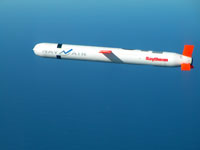|

|
|

|
The Tomahawk Land Attack Missile (TLAM) is a
long-range, all-weather, subsonic cruise missile.
Introduced by
General Dynamics in the 1970s, it was designed as a medium- to
long-range, low-altitude missile that could be launched from a
submerged submarine.
It has been improved several times and, by way of
corporate divestitures and acquisitions, is now made by Raytheon.
There have been several variants of the Tomahawk
employing various types of warheads. The operational versions include
the unitary conventional land attack TLAM-C, the bomblet-dispensing
land attack TLAM-D, the nuclear land attack TLAM-A and TLAM-N (not
deployed), and the Tomahawk Anti-Ship Missile (TASM). Ground Launch
Cruise Missiles (GLCM) and their truck-like launch vehicles were
destroyed to comply with the 1987 Intermediate-Range Nuclear Forces
Treaty.
The Block III TLAMs that entered service in 1993 can fly farther and
use Global Positioning System (GPS) receivers to strike more
precisely. Block IV TLAMs have a better Digital Scene Matching Area
Correlator (DSMAC) system as well as improved turbojet engines. The
WR-402 engine provided the new BLK III with a throttle control,
allowing the missile to slow down or speed up during flight. This
engine also provided better fuel economy. The Block IV Phase II TLAMs
have better deep-strike capabilities and are equipped with a real-time
targeting system for striking moving targets.
|
TOMAHAWK - LAND
ATTACK MISSILE (LAM) Specifications |
|
Type |
All weather long range submarine or
ship-launched land-attack cruise missile |
|
Manufacturer |
Raytheon |
|
Weight |
2,650lb (1,193kg), Warhead up to 1,000lb |
|
Warhead |
Conventional: 1,000 pounds, or Conventional
submunitions dispenser with combined effect bomblets, or WDU-36 warhead with PBXN-107 explosive & FMU-148 fuse, or 200kt W-80 nuclear device |
|
Length |
18ft 3in (5.5m) |
|
Diameter |
20.4in (52cm) |
|
Wingspan |
8ft 9in (2.7m) |
|
Performance |
Range 1,000 miles (1,600km), speed 550mph
(890kmh), guidance inertial and TERCOM |
|
Propulsion |
Williams International F107-WR-402 cruise turbo-fan engine;
solid-fuel booster |
Photo US Navy
|

